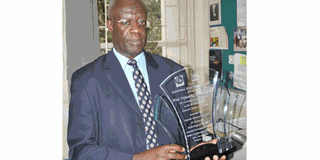The magic of research and morals

Prof Sewankanbo shows off his award. Photo by Martin Ssebuyira.
What you need to know:
Prof. Nelson Sewankambo: The winner of this year’s Bioethics award believes that in order for research to derive its value, morals cannot be divorced from the process. The renowned researcher and academician has won the admiration of his peers and society and championed the HIV clinical drug trials in Rakai District.
In 1981 when many Ugandans in Rakai District were dying of a strange new deadly disease many named ‘slim’ because of the excess loss of weight it caused to its victims, he was among the earliest physicians to pitch camp in the area to conduct research that would later produce results in the race to define the disease now internationally known as HIV/Aids.
Professor Nelson Kawulukusi Sewankambo, 60, has earned a name for being at the forefront of research, specialising in HIV clinical drug trials and promotion of bioethics.
“It is not the same way you see it today. It was a new disease puzzling all doctors with severe diarrhea, frequent fevers, severe slimming and itchy skin rush,” he recalls.
Being a young lecturer at Makerere University burning with enthusiasm in medical research, Prof Sewankambo camped in Rakai and established the Rakai Project that unearthed the deadly disease.
In his career as a researcher spear-heading bioethics and helping to guide researchers to carry out their work ethically and professionally, Sewankambo marveled at being announced the winner of the 2012 annual National Bioethics award on Tuesday early this week.
He beat five other counterparts; associate professors, Florence Mirembe, David Guwatudde, Dr Peter Olupot, Prof Peter Mugyenyi and Prof Charles Rwabukwali, after exhibiting outstanding contribution in protection of human research participants.
Born in 1952 at old Mulago in Kampala, Sewankambo attended Kazo Primary School and Namilyango College School before joining Makerere, where he trained in general medicine. He later upgraded to a Masters in internal medicine and later graduated in clinical epidemiology at the McMaster University, Canada.
Having been honoured by the Royal College of Physicians in London and awarded a Fellowship at the College. He received an Honorary Doctor of Laws degree from McMaster.
He devoted his last 13 years of professional life to the advancement of medical education, research and capacity development.
A professor of Medicine and Principal of Makerere University College of Health Sciences, a position he took up after serving as Dean of Makerere University Medical School for 11 years, Sewankambo is the vice president of the Accordia Global Health Foundation and Council Member for Global Forum for Health Research.
He is also a member of the National Aids Research Committee, which is a national review board for Aids research. Sewankambo has spearheaded the development of the Bioethics Centre at Makerere University as well as the Masters programme in Bioethics.
He believes that as Dean, he is responsible for change from a teacher-centered lecture-based medical curriculum to student centered education grounded in problem based learning and Ccommunity based education and service.
“This is not a secondary school where people learn, pass exams and go. It is a university where students exchange ideas, conduct research and usher in new knowledge that benefits society and the globe,” he argues.
Dr Sewankambo has not restricted application of his knowledge and skills to the Uganda scene alone. He has contributed significantly to the international environment including the Global Forum for Health Research, Nuffield Council Working Party on Ethics of Health Care Related Research in Developing Countries, International Clinical Epidemiology Network, International Joint Learning Initiative on Human Resources for Health and Development, FAIMER and the African Initiative on the impact of climate change: mitigation and adaptation.
As co-chair of the education/production subcommittee of the initiative, he contributed to the landmark report entitled “Human Resources for Health, Overcoming the Crisis,” which had a major influence on the World Health Organisation programme and its recent 2006 report (Together for Health) which focus on the global crisis of health workers and the need for urgent action in order to enhance health of populations.
He was also a contributor to the chapter on how to build strong education and training systems of the Global Health Workforce Alliance Lord Nigel Crisp Report 2008: Scaling up education and training for health workers.
He is also known for chairing the National Taskforce for Review of National Guidelines for Research Involving Humans as Research Participants 2005-2007 and a very active researcher health. He participated in various discussion groups and planning meetings of Fogarty International Centre and provided guidance on the agenda for second Global Forum on Bioethics in Research (March 2000).




